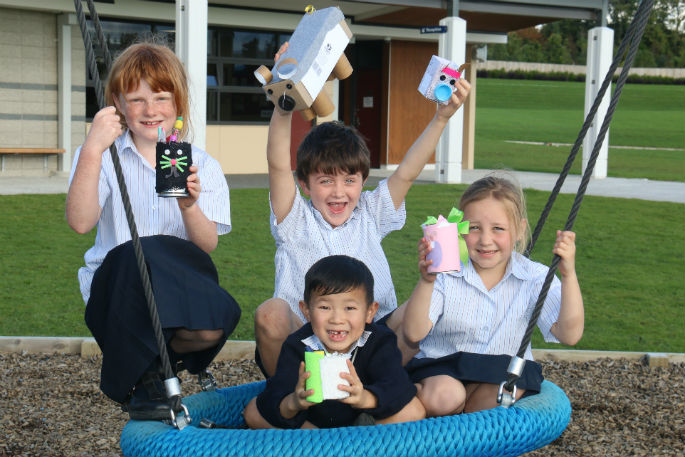ACG Tauranga pupils will mark World Environment Day this week, as the school continues its ongoing commitment to actively reducing its environmental footprint.
World Environment Day – a United Nations initiative – is on June 5, but the school will celebrate it on June 3.
Year 1-4 pupils will learn about the link between the earth's natural resources and the products they use – and how they can make a difference by recycling, composting and reusing.
Principal Shawn Hutchinson says the school is designed as a zero-waste campus – influencing everything from the design of the buildings to the way the curriculum is delivered.
'One of the advantages of being a new school is that we were able to design the buildings specifically to reduce their environmental impact through low energy use,” says Shawn.
'The way a 21st Century school looks is very different to the way schools were designed in the 1960s.
'With the foundations in place to be a green school, our students are taking it to the next level, embracing the ‘zero waste policy' – whether it's using less paper, or influencing what they have in their lunchboxes. They are excited to mark World Environment Day and make this an ongoing commitment.”
Technology allows the school to create optimal temperatures for students to learn, while using as little energy as possible.
The electricity saved by the heat pump heating system in the primary school is enough to power one-and-a-half average houses for a year.
Innovative energy-saving techniques include automatically cooling classrooms with natural ventilation, using electrically operated and time-controlled windows. Sensors close the windows when certain rain or wind conditions are detected – but the class teacher retains control of the system.
Sensors throughout the school ensure lights are switched off when rooms are empty. In the soon to be built gymnasium, radiant heating will allow the spectator areas to be targeted - without wastefully heating the whole gym.
The essence of the zero waste policy is to reduce, reuse, and recycle to minimise waste. There are bins in classrooms for paper recycling, and plans to create a worm farm to eliminate organic waste.
'The students have really embraced the zero waste concept, and we have noticed more students using reusable containers and sandwich bags, rather than plastic bags and cling-wrap,” says Shawn.
'One of the long-term benefits of this programme is teaching our young people about resource value, waste minimisation and recycling – and they're taking this knowledge home to their families too.”
Teaching methods also play into the zero waste policy. The school's Bring Your Own Device programme means pupils can access teaching and learning materials without excessive printing of resources.
'Schools, especially primary schools, can be notorious for their paper wastage, and we are making a concerted effort to combat this,” says Shawn.
'Our students and staff make a huge contribution to ensuring that the digital technology is used in an environmentally responsible way.
'Our print management helps save trees, minimise waste and reduce energy usage.”
Shawn says reducing the environmental footprint of the school is an ongoing process, with new initiatives in the pipeline.
'We have big plans for a native regeneration project of the gully area of the school, including walkways leading to The Lakes development. We are also looking forward to creating a school vegetable garden.”
Other planned initiatives include a Smart Paper Choice policy – reducing printing and stopping junk mail – and encouraging the sale of second-hand school uniforms and textbooks as the school grows.

